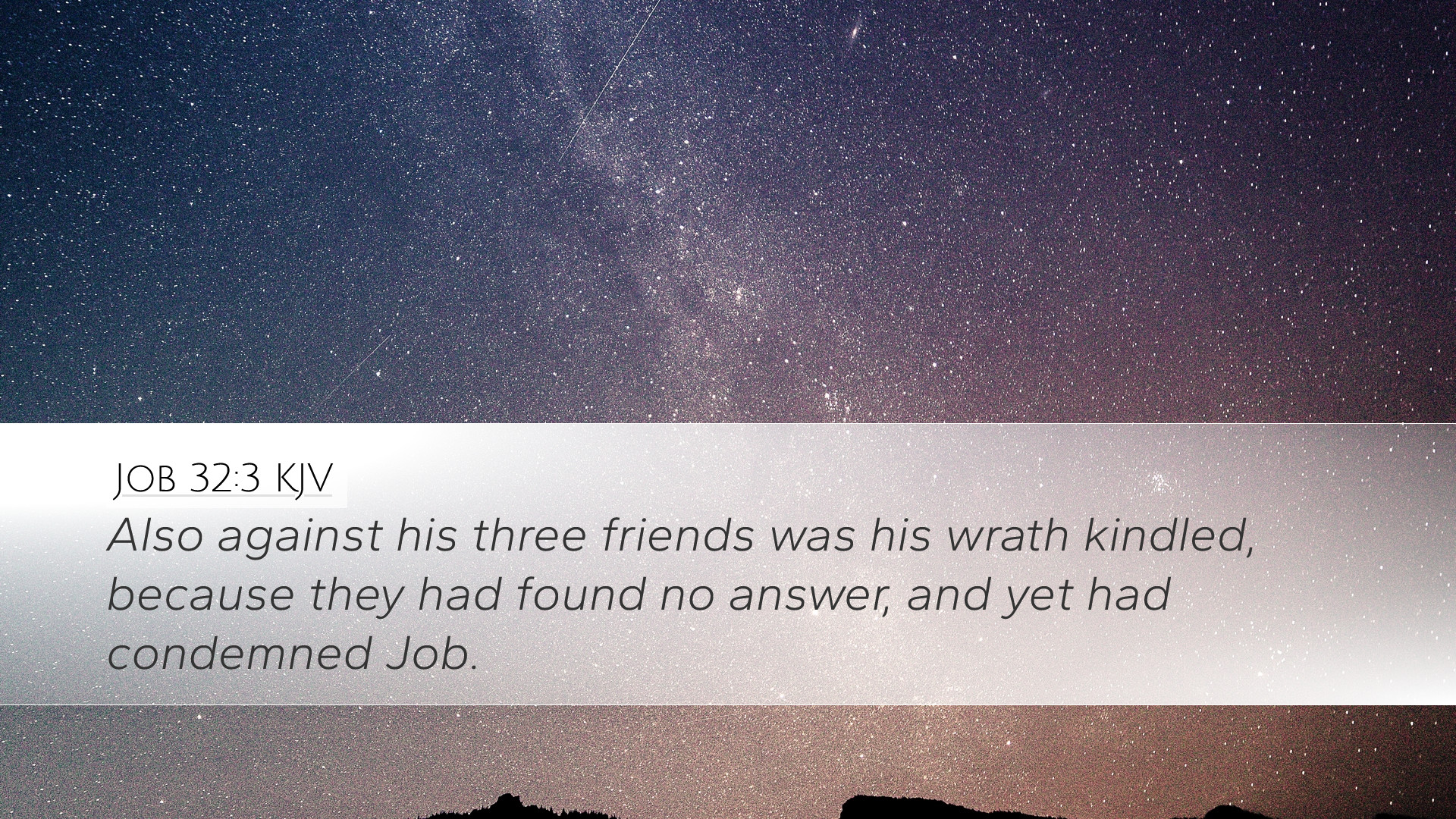Old Testament
Genesis Exodus Leviticus Numbers Deuteronomy Joshua Judges Ruth 1 Samuel 2 Samuel 1 Kings 2 Kings 1 Chronicles 2 Chronicles Ezra Nehemiah Esther Job Psalms Proverbs Ecclesiastes Song of Solomon Isaiah Jeremiah Lamentations Ezekiel Daniel Hosea Joel Amos Obadiah Jonah Micah Nahum Habakkuk Zephaniah Haggai Zechariah MalachiJob 32:3
Job 32:3 KJV
Also against his three friends was his wrath kindled, because they had found no answer, and yet had condemned Job.
Job 32:3 Bible Commentary
Commentary on Job 32:3
Job 32:3 states: "Also against his three friends was his wrath kindled because they had found no answer, and yet had condemned Job." This verse serves as a critical turning point in the narrative of Job, where we witness the emergence of a new character, Elihu, a younger observer of the discourse between Job and his friends.
Historical Context
Job's Suffering: The Book of Job is anchored in the exploration of suffering, righteousness, and divine justice. Job, a man blameless and upright, finds himself enduring severe trials and tribulations. His three friends—Eliphaz, Bildad, and Zophar—come to comfort him but instead engage in a prolonged debate over the reasons behind his suffering.
Elihu's Role: Elihu's introduction in Job 32 marks a shift in the dialogue. He represents a voice of youth and passion, and his anger is stirred by the failure of Job's friends to provide an adequate answer to Job's plight.
Insights from Public Domain Commentaries
Matthew Henry's Commentary
Henry emphasizes that the anger of Elihu justified as he perceived a lack of true understanding from Job’s friends. When they condemned Job without a thorough exploration of the matter, it demonstrated a failure in their argumentation. Elihu’s wrath was kindled not just against his friends but also at Job, for justifying himself rather than admitting his frailty before God.
Henry states that Elihu’s discourse brings a fresh perspective on divine wisdom, one that hints at God’s sovereignty over human suffering and the necessity of humility in the face of divine mystery.
Albert Barnes' Commentary
Barnes focuses on the motivations behind Elihu's anger. He illustrates that Elihu's indignation serves a dual purpose; it reflects indignation against both the unhelpful responses of Job's friends and the misguided justifications that Job articulates in his defense. Barnes notes that this verse highlights human limitations in comprehending God’s purposes.
- Elihu's Perspective: He represents a new angle that seeks to assert that God communicates in various ways, and often through suffering, to guide and mold human character.
- The Role of Wisdom: Barnes points out that Elihu is the first to speak of the necessity of divine wisdom and understanding, contrasting the limited perspectives of the friends and Job.
Adam Clarke's Commentary
Clarke delves into the emotions involved in this verse, particularly the anger of Elihu. He explains that Elihu is not merely angry for personal reasons but is stirred by the gravity of the situation. He criticizes the relentless accusations of Job's friends, outlining that they pursued a dangerous path of misjudging Job’s character, which aligned with a failure to understand the complexity of God’s dealings with humanity.
Clarke articulates that Elihu seeks to introduce a more nuanced dialogue that emphasizes the character of God as an instructor through suffering, which transcends human understanding.
Theological Implications
This verse opens the floodgates for discussions on the nature of divine justice and human comprehension: how often do we, like Job’s friends, attempt to box God into our limited understanding? Elihu’s anger serves as a corrective measure, reminding both Job and his friends that God’s wisdom is profound and often operates beyond simple cause and effect.
Applications for Today’s Believers
- Recognizing the Limits of Our Understanding: Just as Elihu challenges the assumptions of Job’s companions, believers today are called to approach discussions of suffering with humility.
- The Importance of Listening: Elihu emphasizes the value of listening before responding. In church and community, it is vital to understand others’ experiences fully before offering counsel or judgments.
- God’s Sovereignty in Suffering: This verse encourages believers to reflect on how suffering might be part of God’s intricate plan for refining faith and character.
Conclusion
Job 32:3 encapsulates a pivotal moment in the Book of Job, where the dialogue shifts towards a deeper understanding of God’s wisdom amidst human suffering. Elihu’s intervention challenges the surface-level interpretations and encourages a relational understanding of God’s dealings with humanity. This insight invites readers to cultivate a posture of learning, humility, and openness to divine truths that surpass human logic.


